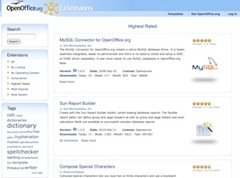FSF criticizes proprietary OpenOffice extensions
The new list only takes into account free extensions
The open source office package OpenOffice is a prime example of free software. "Offering OpenOffice in the normal way means that users are also offered proprietary extensions," criticizes Peter Brown, Executive Director of the Free Software Foundation (FSF) http://www.fsf.org. This has therefore announced a list as a replacement for OpenOffice's own extension library http://www.fsf.org/openoffice that only includes free OpenOffice extensions.
True freedom
The FSF are proprietary OpenOffice extensions a thorn in the side. The OpenOffice.org Community Council was therefore asked to either take it from the Extension Library http://extensions.services.openoffice.org to delete or to operate at least two completely separate lists of free and proprietary extensions. "I agree that our extensions website can be improved, but I don't think the FSF requirement makes sense," said Florian Effenberger, Marketing Manager at OpenOffice, to pressetext.{jumi [plugins/content/jumi/newsgrafik.php]}
OpenOffice is currently implementing a sorting option according to license type for its extension library. But this step is not enough for the FSF. With its alternative library, the organization therefore wants to offer users the opportunity to have the certainty that they are only using really free, open source extensions. When the relevant list has been completed, the FSF will also work with volunteers to develop free alternatives to proprietary OpenOffice extensions.

OpenOffice extension library: Not free enough for the FSF (Photo: openoffice.org)
Freedom of choice
OpenOffice has set an example with the new sorting option, but the deletion of non-free extensions required by the FSF is not an issue. "We are absolutely convinced that free open source software offers better software, even with extensions. But the user must have the freedom to make a comparison and to draw his conclusions," said a response from the OpenOffice.org Community Council .
"I'm a big advocate of free software, but while I may not use proprietary extensions, there are legitimate use cases," Effenberger emphasizes. He also points out that, in general, there is a living ecosystem around open source in which companies sometimes offer proprietary products and services.(ck)
.

